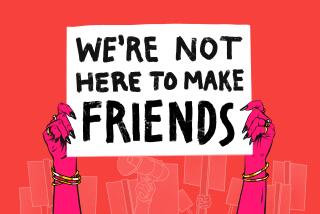The Monitor: ‘Downsized’ on WEtv takes on a real topic
- Share via
And so it has come to this: reality television finally confronting a reality that cameras can’t mask. “Downsized” (WEtv at 9 p.m. Saturdays) follows the Bruces of Anthem, Ariz., a family in financial free-fall. Father Todd’s construction business burst in the economic collapse that did so much damage to the exurbs, and the family gets by on the salary earned by Laura in her job as an elementary school teacher. Together, they have seven children from previous relationships, ranging in age from 10 to 17: Todd has two (Heather and Levi) and Laura has five (Bailey, Whitney, Dylan, Rex, Danielle).
This is poverty as defined by the confines of reality television, though. First, it’s distinctly not urban. The family is still renting a huge house for a reasonable price, though not reasonable enough — most of the first episode is given over to whether the family can make rent and most of the second to whether they should move to a more affordable place.
Furthermore, “Downsized” puts a sympathetic white, middle-class face on poverty. Or, as viewed through the eyes of those who suffer through persistent poverty or those who are aware that persistent poverty exists, maybe not so sympathetic.
“A teacher’s salary is pitiful,” Laura complains. “Sometimes I forget that I’m even getting a paycheck because it’s so little. I feel like I’m doing volunteer work.” Perhaps there’ll be a spinoff show in which several out-of-work teachers compete for her job.
When the family looks for a place to move, again, the concerns expressed aren’t universal. “We see some houses that might fit us, but they have absolutely no yard and no driveway,” Laura says. “We look at another house, and it’s in an area that there’s police officers patrolling the area.”
Never mind that plenty of families live in such circumstances, and some thrive. “Downsized” is less interested in making broad statements about the American poor than in milking familiar reality soap themes: There’s tension between Todd and Laura and quibbles between various children. Todd attempts unsuccessfully to look for work, but family drama is this show’s engine. Reality television oversharing is the new work-to-welfare.
“Downsized” isn’t alone in staring hard at the economic downturn. In Lifetime’s “The Fairy Jobmother,” a stern British career counselor of the same ilk as Simon Cowell and Supernanny brings ritual abuse to the unemployed. And for some time, shows like “Extreme Makeover: Home Edition” and its charity-reality offspring, have been bringing the plights of the less fortunate to television.
Where “Downsized” differs is that it’s not clear that its arc will have a happy resolution. Laura and Todd place no apparent burden on their children to contribute to the household finances, though that doesn’t stop Dylan from selling his prized baseball glove or some of his siblings from going dumpster diving for empties and other recyclables.
That the children do this with a smile — perhaps dumpster diving on a TV show is somehow less stressful than dumpster diving with no cameras around — is a testament to their resilience. But “Downsized” also highlights how some of the children, particularly Bailey, struggle with the family’s slide into poverty.
But will “Downsized” be bold enough to show how the children deal with something almost as insidious: reality TV celebrity? Series like “The Hills” have long ignored that starring on such a program alters people’s lives in a way that’s inconsistent with the way they live on TV.
One of the only shows to attempt a holistic blend of pre-and-post-reality lives was “Jon & Kate Plus 8,” a show to which “Downsized” has any number of uncomfortable parallels. There’s the looming dark cloud as we watch the possible dissolution of a family in real time. And maybe there’s product placement and tabloid coverage and prurient interest no amount of money can dull.
Participating in a reality show is not especially lucrative, but if “Downsized” moves into a second or third season, certainly the Bruces will have found ways to benefit financially from the cameras they’ve let invade their lives. Will the persistence of debt then be an illusion maintained to continue reality television fame?
What’s worse: to be a TV star while capitalizing on your misfortune or to maybe someday be well off again but no longer TV stars?
More to Read
The complete guide to home viewing
Get Screen Gab for everything about the TV shows and streaming movies everyone’s talking about.
You may occasionally receive promotional content from the Los Angeles Times.






